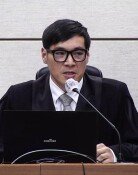Resistance of Central Agencies Bars Local Autonomy
Resistance of Central Agencies Bars Local Autonomy
Posted December. 12, 2004 23:01,
It turned out that the heads of local governments give 5.1 points out of 10 to the line and the pace of the decentralization policy that the Roh administration is carrying out. Also, they see the resistance of the central government ministries and agencies to be the biggest stumbling block to the decentralization.
These are the results of a survey conducted by a team of reporters of Dong-a Ilbo. They surveyed heads of local governments of 16 wide-area units and 234 lowest level units owing to the coordination of the National Association of Provincial Governors and the National Association of Mayors.
Among 250 local governments, the heads of wide-area units all answered, but 161 out of 234, or 70.8 percent of, heads of the lowest-level units replied.
They gave 4.62 points out of 10 to the current state of decentralization and pointed out that the will of the administration to drive local autonomy has weakened since the inauguration (7.45 points for the current state when allowing 10 for the early days of the Roh administration).
The biggest obstacles were resistance of the central agencies (34 percent), followed by local governments opinions are not properly reflected (27 percent), policy reduced and changed along the procedure (16 percent), and policy conducted mainly by public officials of the central agencies (10 percent).
In addition, the president was polled as having the strongest influence over the process of decentralization, followed by central government agencies, the Governmental Innovation Decentralization Committee, the National Assembly, and the parties. They saw themselves as having the weakest influence over the policy.
To the question about the challenges that local governments face for decentralization, they picked local governments lack capability such as the quality of civil servants (31 percent), local councils lack capability (30 percent), and local residents and civil groups do not play their due roles (27 percent).
Jong-Dae Ha Kang-Myoung Chang orionha@donga.com tesomiom@donga.com





![“설거지해도 그대로”…냄비 ‘무지개 얼룩’ 5분 해결법 [알쓸톡]](https://dimg.donga.com/c/138/175/90/1/wps/NEWS/IMAGE/2026/01/15/133164664.3.png)

